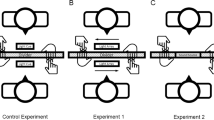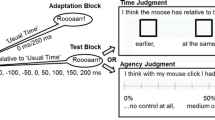Abstract
Previous studies have documented temporal attraction in perceived times of actions and their effects. While some authors argue that voluntary action is a necessary condition for this phenomenon, others claim that the causal relationship between action and effect is the crucial ingredient. In the present study, we investigate voluntary action and causality as the necessary and sufficient conditions for temporal binding. We used a variation of the launching effect proposed by Michotte, in which participants controlled the launch stimulus in some blocks. Volunteers reported causality ratings and estimated the interval between the two events. Our results show dissociations between causality ratings and temporal estimation. While causality ratings are not affected by voluntary action, temporal bindings were only found in the presence of both voluntary action and high causality. Our results indicate that voluntary action and causality are both necessary for the emergence of temporal binding.


Similar content being viewed by others
Notes
Some studies have used the mean temporal judgment instead of the median (Engbert et al. 2007, 2008). In fact, in our results, response distributions were fairly normal and analysis of mean temporal judgments revealed similar results. However, we believe that median temporal judgments are preferable as they are less susceptible to outliers. Recent studies (Humphreys and Buehner 2009) also use median temporal judgments.
The wide error bars are due to a large inter-individual variability in how the time scale is used. However, this does not affect the intra-individual consistency in how the experimental manipulations affect temporal judgments.
References
Buehner MJ, Humphreys GR (2009) Causal binding of actions to their effects. Psychol Sci (in press)
Eagleman DM, Holcombe AO (2002) Causality and the perception of time. Trends Cogn Sci 6:323–325
Engbert K, Wohlschlager A, Thomas R, Haggard P (2007) Agency, subjective time, and other minds. J Exp Psychol Hum Percept Perform 33:1261–1268
Engbert K, Wohlschlager A, Haggard P (2008) Who is causing what? The sense of agency is relational and efferent-triggered. Cognition 107:693–704
Haggard P (2005) Conscious intention and motor cognition. Trends Cogn Sci 9:290–295
Haggard P, Clark S, Kalogeras J (2002) Voluntary action and conscious awareness. Nat Neurosci 5:382–385
Haggard P, Aschersleben G, Gehrke J, Prinz W (2002a) Action, binding, and awareness. In: Hommel B, Prinz W (eds) Attention and performance, vol 19, common mechanisms in perception and action. Oxford University Press, Oxford, pp 266–285
Humphreys GR, Buehner MJ (2009) Magnitude estimation reveals temporal binding at super-second intervals. J Exp Psychol Hum Percept Perform (in press)
Michotte AE (1946/1963) The perception of causality. Methuen, London
Moore J, Haggard P (2008) Awareness of action: inference and prediction. Conscious Cogn 17:136–144
Moore JW, Lagnado D, Deal DC, Haggard P (2009) Feelings of control: contingency determines experience of action. Cognition 110:279–283
Scholl BJ, Tremoulet P (2000) Perceptual causality and animacy. Trends Cogn Sci 4:299–309
Wagemans J, Van Lier R, Scholl BJ (2006) Introduction to Michotte’s heritage in perception and cognition research. Acta Psychol 123:1–19
Wegner DM (2004) The illusion of conscious will. Behav Brain Sci 27:649–692
Wenke D, Haggard P (2009) How voluntary actions modulate time perception. Exp Brain Res 196(3):311–318
Young ME, Falmier O (2007) Launching at a distance: the effect of spatial markers. Q J Exp Psychol 61:1356–1370
Young ME, Rogers ET, Beckmann JS (2005) Causal impressions: predicting when, not just whether. Mem Cogn 33:320–331
Acknowledgments
This work was supported by the Fundação de Amparo à Pesquisa do Estado de São Paulo, grants 2005/60461-5 and 2006/50189-9. We are grateful to Carolina Feher da Silva, Hamilton Haddad Jr., Milene Regatão, Leo Arruda and an anonymous reviewer for their helpful comments on the manuscript. We thank the volunteers that participated in the experiments.
Author information
Authors and Affiliations
Corresponding author
Rights and permissions
About this article
Cite this article
Cravo, A.M., Claessens, P.M.E. & Baldo, M.V.C. Voluntary action and causality in temporal binding. Exp Brain Res 199, 95–99 (2009). https://doi.org/10.1007/s00221-009-1969-0
Received:
Accepted:
Published:
Issue Date:
DOI: https://doi.org/10.1007/s00221-009-1969-0




